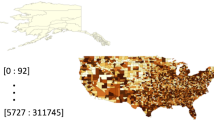
Overview
- Provides a comprehensive overview of the changes to US election administration and voting methods
- Gives policy recommendations for how to structure future elections, particularly those conducted during health pandemic
- Includes original research from scholars in elections doing emergent work on the impacts of COVID-19
Part of the book series: Elections, Voting, Technology (EVT)
Access this book
Tax calculation will be finalised at checkout
Other ways to access
About this book
In this book, leading and emerging election scholars document the steps that state and local election officials took to augment their elections during the COVID-19 pandemic and the effects of these changes. Written for academics, practitioners, and election laypeople, this book details what went right, what went wrong, and what we can learn from the 2020 US presidential election. The 2020 election cycle was unique in American history. Held during the COVID-19 pandemic, efforts were made at the federal, state, and local levels to ensure voters could safely access elections. These changes included providing greater access to mail/absentee voting, installing ballot drop boxes, outfitting polling places with protective equipment, and much more. Many of these changes were politicized, with Republicans and Democrats viewing these changes differently.
Contributing authors address how states and localities altered their elections in light of the pandemic; poll worker motivation for working during a health crisis, and how the changes to elections were viewed by election officials; the effects of these changes on whether a citizen decided to cast a ballot, how they voted, and who they voted for; how these changes influenced evaluations of elections, how long voters waited to cast a ballot, and their confidence in the outcome of the election; and, finally, what we can learn about election administration, access, and evaluations from this historic election.
Similar content being viewed by others
Table of contents (8 chapters)
-
Front Matter
-
Vote Methods, Vote Choice, and Voter Turnout
-
Front Matter
-
-
Back Matter
Editors and Affiliations
About the editors
Joseph A. Coll is Assistant Professor of Political Science at the College of Wooster, USA. His research examines the factors that influence the access and administration of elections, how that access and administration affects political behavior and public opinion, and how this then goes on to affect public policy.
Joseph Anthony is Assistant Professor of Political Science at SUNY-Cortland, USA. His research focuses on elections administration and public policies, as well as political parties and organizations in the United States. His research priorities investigate the electoral and institutional structures that impact political participation, and the organizational structures that mobilize this participation.
Accessibility Information
PDF accessibility summary
This PDF does not fully comply with PDF/UA standards, but does feature limited screen reader support, described non-text content (images, graphs), bookmarks for easy navigation and searchable, selectable text. Users of assistive technologies may experience difficulty navigating or interpreting content in this document. We recognize the importance of accessibility, and we welcome queries about accessibility for any of our products. If you have a question or an access need, please get in touch with us at accessibilitysupport@springernature.com.
EPUB accessibility summary
This ebook is designed with accessibility in mind, aiming to meet the ePub Accessibility 1.0 AA and WCAG 2.0 Level AA standards. Its features include described images and other non-text content, screenreader-friendly navigation and accessible math. Math is represented either as MathML, LaTeX or in images. If math is represented as image, Alt Text might not be present. We recognize the importance of accessibility, and we welcome queries about accessibility for any of our products. If you have a question or an access need, please get in touch with us at accessibilitysupport@springernature.com.
Bibliographic Information
Book Title: Lessons Learned from the 2020 U.S. Presidential Election
Book Subtitle: Hindsight is 2020
Editors: Joseph A. Coll, Joseph Anthony
Series Title: Elections, Voting, Technology
DOI: https://doi.org/10.1007/978-3-031-44549-1
Publisher: Palgrave Macmillan Cham
eBook Packages: Political Science and International Studies, Political Science and International Studies (R0)
Copyright Information: The Editor(s) (if applicable) and The Author(s), under exclusive license to Springer Nature Switzerland AG 2023
Hardcover ISBN: 978-3-031-44548-4Published: 01 February 2024
Softcover ISBN: 978-3-031-44551-4Published: 18 February 2025
eBook ISBN: 978-3-031-44549-1Published: 31 January 2024
Series ISSN: 2945-7610
Series E-ISSN: 2945-7629
Edition Number: 1
Number of Pages: XVIII, 219
Number of Illustrations: 7 b/w illustrations, 9 illustrations in colour
Topics: Political Science, Electoral Politics, Public Administration, Political Leadership



